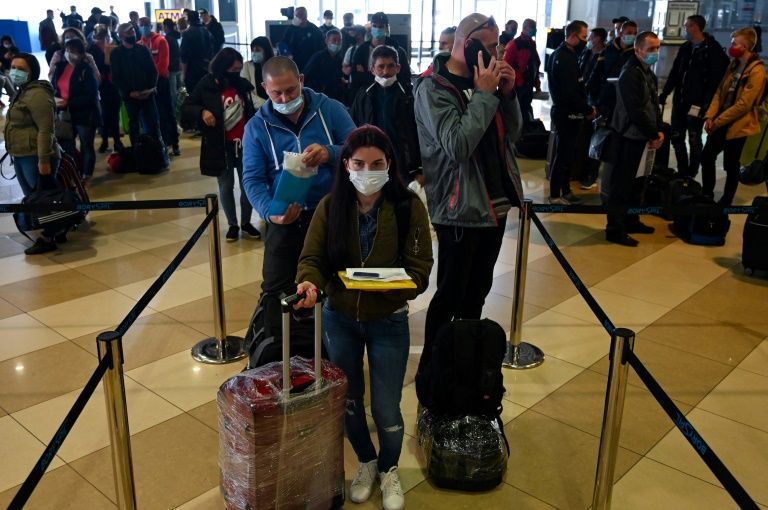Virus highlights plight of Europe’s migrant farm hands
Ukrainian seasonal workers wait in line for a charter flight to Finland in May . ©AFP/File GENYA SAVILOV
Paris (AFP) – From Romania, Poland, Morocco and Thailand, thousands of people flock to Western Europe each year to help farmers harvest precious crops, often paid low wages for long, backbreaking days of work.
The migrant labourers’ often poor work conditions are a point of recurring controversy, but the coronavirus outbreak has thrown their plight into stark relief with the added risk of contagion in overcrowded, unsanitary living quarters.
Several outbreak clusters were reported among workers — with 174 infections on a farm in Bavaria in Germany, 250 on another in Aragon, Spain, and 170 in Provence, France, since the European harvesting season began.
Italy had to send riot police to a council estate in Mondragone, north of Naples, after a cluster of more than 100 coronavirus cases among Bulgarian workers living there sparked tensions with locals.
With harvests set to continue until October, “it is very likely that we will see new outbreaks associated with seasonal workers,” warned Fernando Simon, chief epidemiologist at the Spanish Ministry of Health.
Yet many of the workers are illegal, with no recourse to medical care and who move under the radar to avoid visa controls.
Few have access to coronavirus testing, and any infections among them run the risk of spreading the virus, even after their return home.
– Impossible without them –
But Europe’s economy, devastated by the pandemic, cannot afford to lose these workers, many from the east of the continent and from Africa.
France’s agriculture minister Julien Denormandie said last week the government would not be “dogmatic” at this stage about its plans to regularise migrant labour, much reduced by virus-busting limits imposed by Europe on population movement.
If farmhands cannot be found locally, “we are not going to let the fruit and vegetables rot or leave the grapes unpicked, so we turn to other countries where men and women agree to come and harvest” in France, the minister told the Europe 1 broadcaster.
As continent-wide lockdowns persisted in May, farmers from several regions of Italy chartered planes to bring workers from Romania and Morocco.
For worker Maria Codrea, whose annual income depends largely on her salary from picking grapes in Italy, the alternative of playing it safe and staying in Romania “would have been hard”.
On the other side of the coin, Spanish farmer Ignacio Gramunt affirmed: “without them, we would not be able to do it.”
– Sleeping on cardboard –
But while farm labourers were hailed along with other essential workers for keeping locked-down citizens fed during the epidemic, this has not always translated into better treatment.
In the Andalusian village of Lepe in Spain, dozens of African migrant workers have been camped outside the town hall since the shacks they were living in, without water or electricity, burnt down two weeks ago.
“We sleep on these mattresses and cardboard boxes because we have no alternative,” lamented Lamine Diakite, a 32-year-old Malian farm labourer interviewed by AFP.
In Italy, the government promised in May to regularise temporarily undocumented seasonal workers.
But few employers have agreed to pay the 500-euro ($586) fee required for this administrative procedure, according to local media.
Sweden relaxed travel restrictions in June to enable foreign farm hands and berry pickers, many from Thailand, to enter, with employers obliged to take steps to ensure they can keep an safe distance from one another on the trip and during their stay.
Germany, too, requires farmers to ensure workers can work and live “strictly separate” from one another for the first 14 days, and to not leave their host farm for the period.
– ‘Pick for Britain’ –
In Denmark, the authorities urged agricultural employers to ensure workers are tested on arrival, then isolated for 48 hours or until they test negative.
Portugal has gone further, granting free access to public services to paperless migrants during the epidemic.
In spite of government efforts, uncoordinated as they are, many farmers have battled to find the hands they need.
In Germany, only 40,000 of the required 300,000 foreign workers could be recruited this season, meaning part of the fresh produce harvest will remain on trees or in the ground.
In Italy, the epidemic caused a shortfall of between 250,000 and 270,000 workers, the agriculture ministry said.
One option: going local.
The British government launched a campaign dubbed “Pick for Britain” encouraging locals to replace some of the 70,000 foreign farm hands needed for the summer harvest.
burx-pid/mlr/sjw/bsp
Disclaimer: Validity of the above story is for 7 Days from original date of publishing. Source: AFP.


